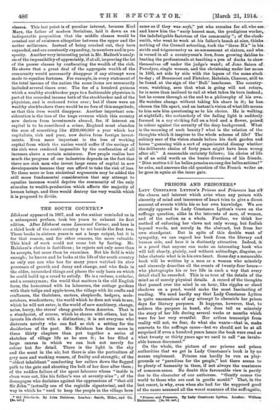THE SOUTH COUNTRY.*
Idlehurst appeared in 1897, and as the author reminded us in a subsequent preface, took ten years to exhaust its first edition. After Idlehurst came Longwood Corner, and here is a third book of the south country to set beside the first two. Three books in sixteen yeare is not a large output, but it is for that reason, and for other reasons, the more valuable. This kind of work could not come but by fasting. Mr. Halsham's choice is fastidious-; be rejects not only more than he accepts, but more than he examines. But his field is wide enough ; he knows and he looks at the life of the, south country as only one can who has for many years watched its slow processes of growth and decay and change, and who finds in the older, untouched things and places the only basis on which he could build up a creed to satisfy. He is a recluse, a seholar, and a countryman; the world that matters is the old English farm, the homestead with its labourers, the cottage gardens with their tulips and apple-trees, the village with its crafts and craftsmen, the thatchers, carters, shepherds, hedgers, mole. catchers, woodcutters; the world which he does not wish to see, which he will not enter, is the world of new Machinery, change, noise, hurry, the stores' cheap goods from America. That is a standpoint, of course, which he shares with others, but he invests his choice with a distinction; it is not everyone who distrusts novelty who can find so rich a setting for the desideriuns of the past. Mr. Halsham has done more in these thirty chapters than put together a series of sketches of village life as he sees it ; he has filled a large canvas in which we can look not merely Los- colour but for detail. There is the light in the sky and the scent in the air, but there is also the portraiture of grey men and working women, of frailty and strength; of the "oldest inhabitant" conducting her callers down the flagged path to the gate and shooting the bolt of her door after them ; of the sudden failure of the spent labourer whose "inside is clean wore out, like his father's was at seventy-nine"; of the demagogue who declaims against the oppressions of "that old Sir J'n" (actually one of the regicide signatories), and the way in -which he "used to keep the people in the village here
13tainiards. )3y Jelin Enlabani. London an) Co. ttm net.)
same as if they wag-sofa," yet who remains for all-who see. and know him the "surly honest man, the prodigious worker, the indefatigable factotum of the community "; of the clock. smith, who went to work at his father7s bench at nine, thinks nothing of the Council schooling,,took the "three •It's " in his . stride and trigonometry at; an amusement at sixteen, and who. is versed in.all a countryman's lore, from growing dahlias to. beating the profesaionals.at teaching a pen of ducks to show themselvee off under the judge's wand ; of ,..Tone Saiera of , Paradyce,, single woman, and the christening under her name in 1695, set side by side with the lapses of the same stock today; of Beaumont and Fletcher, Rabelais, Chaucer, still to, be found, at the sign of the Bull.' beerhouse. The country- man, watching, sees that what is going will not return, he is more than inclined to rail at what takes its turn instead; but he comes through at the end to a philosophy of his own. He watches change without taking his share in it; he has.. chosen the life apart, and an inetant's vision of.what life means to bins- sets hiss questioning as to his choice. . He is walking. at nightfall; the melancholy of the fading light is suddenly. focused in a my striking full on a bird and a flower, poised: in colour against the serenity of the deep background. What is the meaning of such beauty P what is the relation of the thoughts which it inspires to the whole scheme of life? The solitary seer of the vision stands before his dark garden and, house "guessing with a sort of experimental dismay whether the deliberate choice of forty years might have been wrong- alter all." A reasonable certainty follows; his choice of life is of as solid worth as the busier diversions of his friends. "Dien reettret-il les belles pensees aurang des belles actions?" he asks, and.-answers the old question of the French writer as he goes in again at the inner gate.










































 Previous page
Previous page